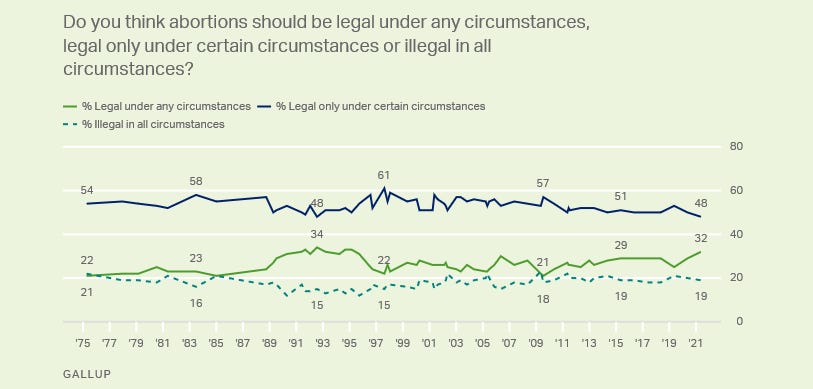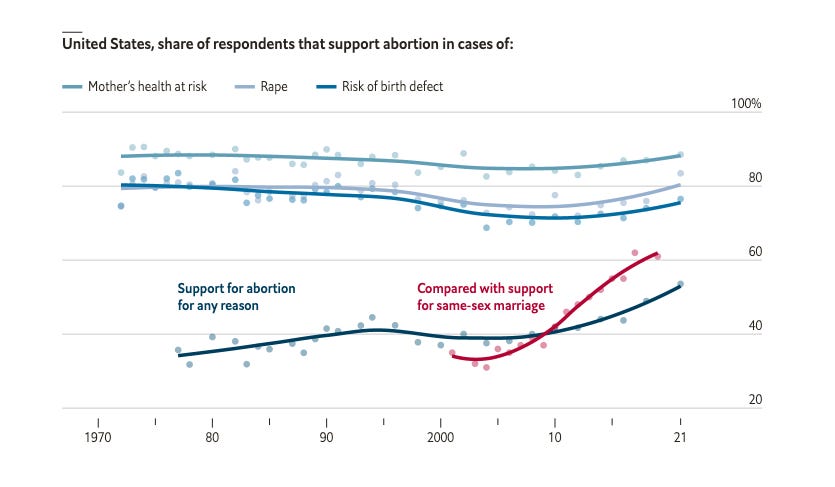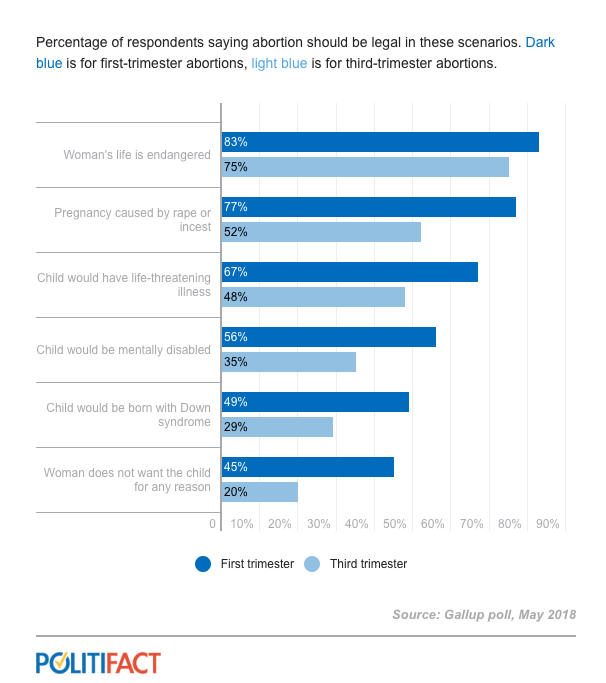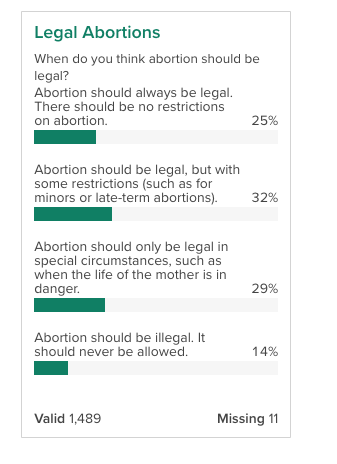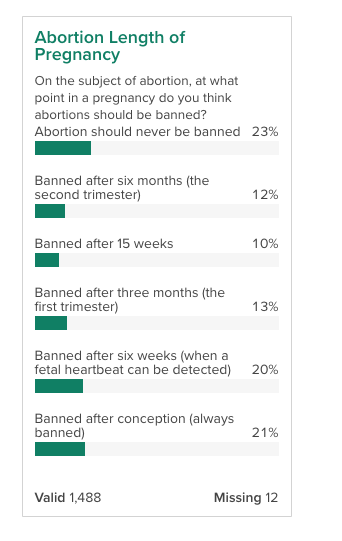What the polls actually say about Americans' attitudes on abortion
The median voter opposes overturning Roe v Wade but supports an abortion ban around the end of the first trimester, with a few key exceptions
This week’s leaked draft of Supreme Court Justice Samuel Alito’s opinion in Dobbs v Jackson Women's Health Organization, which the majority of the Court could use to overturn some or all aspects of the right to an abortion found in Roe v Wade, raises key questions about public opinion on abortion—and has profound implications for democracy in America.
In his opinion, Justice Alito argues that since Roe incorrectly found a federal right to an abortion in Americans’ reasonable right to privacy, abortion policy ought to be left up to the states. But which states’ voters would approve of abortion bans of their own?
Before we get there, let’s start with the national picture. Here, how Americans feel about abortion depends on how you ask the question.
Measure twice, poll… also twice?
For starters, take a poll conducted by the Washington Post and ABC News this week. They asked if Americans would prefer the Supreme Court to uphold or overturn Roe v Wade, and 54% said the Court should uphold it. Only 28% said overturn:
But if you ask under which circumstances Americans approve of abortion, you get different results.
Gallup, for example, has been asking the same question about abortion since the 1970s. They ask: "Do you think abortions should be legal under any circumstances, legal only under certain circumstances, or illegal in all circumstances?" Here are the results over time:
"Legal under certain circumstances" has been the most popular response in every poll they have conducted, generally receiving between 50 and 60% support each year. Meanwhile “legal under any circumstances” has been supported by 20-30% most of the time, while "illegal in all circumstances" has always been the least popular response. Notable in their data is the stability of opinions over time.
Now consider opinions according to the GSS. The Economist this week published the following graph of opinions for different scenarios: if the health of a woman is at risk or if the pregnancy she is carrying was the result of rape. The GSS finds much higher levels of support than Gallup does, with 70-90% of adults approving of procedures in these cases:
One notable difference between the GSS and Gallup data, however, is that the GSS finds a majority of Adults respond “yes” to the question “Please tell me whether or not you think it should be possible for a pregnant woman to obtain a legal abortion if: the woman wants it for any reason?”
That is substantially higher than the percentage saying abortion should be “legal in all circumstances” in the Gallup data. The difference is likely due to the simple yes/no nature of the GSS question. We know that yes/no questions can cause distortions in opinion because of their overly simplistic nature (when was the last time you asked your friend a yes/no question on, say, their religious beliefs or policy preferences?) and so I’m inclined to trust the Gallup number over the GSS one. But that’s why it’s different.
The Pew Research Center has also been asking questions on abortion for many decades. They give respondents a few different options to several questions and then combine the responses into separate categories, such as for people who believe that abortion should be legal in all cases with no exceptions, legal except for a few exceptions, legal in “most cases,” or illegal in all/most cases, and on and on. The results of their most recent survey, conducted this week, are here:
And here is how the trend has evolved:
Apart from the differences in responses that arise from offering people different choices for varying circumstances of abortion, opinions also vary by the duration of the pregnancy. Legal abortion in the third trimester is generally less popular than abortion in the first trimester — which is where abortion has been protected legally by Roe v Wade and Planned Parenthood [of Southeastern Pennsylvania] v Casey. Gallup did a study on this, comparing responses to the same questions if they specified early vs late-term abortions:
I guess now is a good time to mention that only 1% of abortions in the US happen after 21 weeks.
YouGov, an online polling firm, has also looked at differences in opinion by the duration of a woman’s pregnancy. The following screenshots come from the results of their most recent poll. In one question, YouGov finds that 57% of adults agree that pregnancy should EITHER be legal in all circumstances or only banned for late-term procedures:
Yet in response to a different question, 64% of adults said they favored banning abortion either (1) after 15 weeks, (2) after three months), (3) after six weeks, or (4) banning altogether. See here:
Some people have tweeted these numbers claiming that a majority of people thus favor the policy in Mississippi where the Dobbs case comes from, but it’s important to remember that a lot of the people who want abortion banned altogether would not support just a ban after 15 weeks. Another way to report this poll is that 58% of people oppose banning abortion at 6 weeks or earlier.
When it comes to abortion opinion, so much depends on how you count. Here, I think the best takeaway is that the median voter is probably in favor of an abortion ban sometime after the first trimester but before the third. That is, for what it’s worth, what Roe and Casey protect.
The state of the states
The New York Times this week published state-level crosstabs from the Public Religion Research Institute (PRRI). They asked Americans to choose if they think abortion should be "legal in all cases,” “legal in most cases,” “illegal in most cases” or “illegal in all cases.” The NYT added up the percentage of people in each state responding yes to one of the first two categories and subtracted the cumulative percent responding with either of the latter two. The result is the following graph, showing 35 states (+DC) where adults would support legal abortion in all/most cases and 16 where they would oppose it.
State-level crosstabs from Nationscape, a huge poll conducted by the Democracy Fund from 2019 to 2020, affirm these trends. According to their data 41% of Mississippians, for instance, support a full abortion ban (and only 20% do nationally).
Yet 43% in the state say they would “permit abortion in cases other than rape, incest, or when the woman’s life is in danger” (presumably this means in addition to these cases.) That data for other states is vizualized here:
There are even more ways to present the data. Data for Progress, a progressive firm, has modeled responses to the Cooperative Congressional Election Survey and estimates that no state supports a full federal ban on abortion:
That is actually in line with the other surveys. YouGov shows that 14% of adults want abortion to be illegal in all circumstances. Gallup’s data puts that number closer to 20 percent. Those numbers are different… but not really.
Thesis, antithesis, synthesis
Here is, I think, the way to put this all together.
The polling data above support four major conclusions:
A broad majority of adults are opposed to the Court overturning Roe v Wade
80-90% oppose full bans on abortions in all scenarios (which the Alito opinion in Dobbs could enable states to pass)
In addition, no state favors a full ban on abortion, and few likely have majority support for restrictions in all but emergency cases. But more polling with different question wording needs to be done to assess the precise balance here
If you ask people about temporal restrictions, there is likely a majority of US adults in favor of restricting abortions in all but emergency scenarios after the first trimester — or about the 12-15 week mark.
As with so many subjects of public opinion, attitudes on abortion are very complex. The way you ask the question can radically change your results. To get a good picture of how people actually feel you need to reconcile many different data points asking questions in different ways, with different answers, and at different geographies.
For those who want more, there are lots of data here, compiled by the incalculably valuable Karlyn Bowman, a historian of public opinion at AEI.





